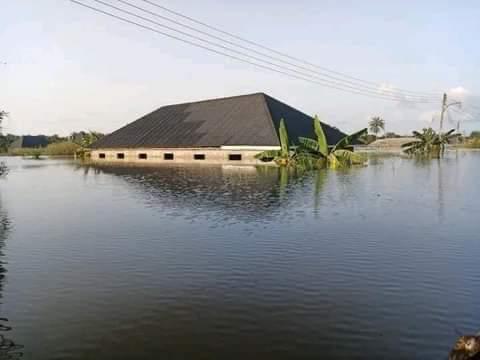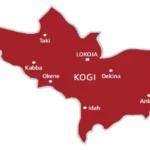The federal government has predicted that 148 local government areas (LGAs) across 31 states in the country risk severe floods during the 2024 wet season. The Minister of Water Resources and Sanitation, Prof. Joseph Utsev, disclosed this during the official unveiling of the 2024 Annual Flood Outlook (AFO) in Abuja. The theme of this year’s AFO is “Promoting the Use of Data Analytics and Modeling for Flood Risk Assessments and Food Security.” The yearly AFO predictions are led by the Nigeria Hydrological Services Agency (NIHSA).
The states identified by the minister include; Adamawa, Akwa Ibom, Anambra, Bauchi, Bayelsa, Benue, Borno, Cross River, Delta, Ebonyi, Edo, Imo, Jigawa, Kaduna, Kano, Katsina, Kebbi and Kogi. Others are Kwara, Lagos, Nasarawa, Niger, Ogun, Ondo, Osun, Oyo, Plateau, Rivers, Sokoto, Taraba and Yobe. Utsev emphasized the importance of proactive measures to mitigate potential flood impact in these areas.
Prof. Utsev further noted that there was need for preparedness, early warning systems, and community engagement to minimize damage to lives and property. He said the high flood risk period would last from April to November 2024; with potential impact on the population, agriculture, livelihoods, livestock, infrastructure and the environment.
Contributing to the discussion, the Director-General of the NIHSA, Clement Nze, stressed the essential role of encouraging collaboration among disaster risk managers, earth observers, mission makers and other stakeholders to enhance preparedness and flood control measures.
The Director General of the Nigerian Meteorological Agency (NiMET), Prof. Charles Anosike, said the partnership between NIHSA and NiMET was pivotal in enhancing the nation’s disaster preparedness. Similarly, the Director General of the National Emergency Management Agency (NEMA), Zubaida Umar, stressed the urgent need for proactive measures to mitigate the impact of flooding across the country.
It would be recalled that earlier in February this year, NiMET presented the 2024 Seasonal Climate Prediction (SCP) in Abuja. The forecasts indicate that while the states of Borno, Abia and Akwa Ibom would witness early onset, rains will be delayed in some parts of the country. The 2024 SCP, which was unveiled by the Minister of Aviation and Aerospace Development, Mr Festus Keyamo, was themed “Facilitating a Weather Resilient Economy Through Early Warnings for all to Foster Renewed Hope and Sustainable Development”.
If, in spite of the timely release of weather forecasts yearly, the flooding of large stretches of farmlands and displacement of residents of riverbanks continue to remain a recurring decimal in Nigeria, it simply suggests how such annual predictions by meteorological and hydrological agencies are never taken seriously by the relevant parties. It appears as though 12 long years after the colossal 2012 flooding across a large swathe of Nigeria, the country has learnt no lessons. This is how, year-in year-out, predictions come to pass with floods always happening as predicted. This is indisputably an indictment, both on residents of flood risk regions as well as relevant government authorities.
While residents of floodplain areas have obstinately refused to relocate from the disaster risk zones, including watersides and drainage ways, it is inexcusable that government has failed to compel them to leave such areas. More disturbing is the failure of government to implement recommendations of reports submitted after every flood disaster. Instead of using funds meant for ecological projects designed to mitigate flood and the burdens of climate change on vulnerable communities, governors and federal agencies rather turned such funds into their ‘backup treasuries’. For example, ecological funds were some time ago diverted to non-eco schemes including combating Ebola outbreak.
Again, the refusal by government to construct buffer dams along River Benue as a long-term measure and deliberate attempt to control excess water discharged from Lagdo dam in Cameroun, lends credence to public insinuations that government officials in environmental and disaster management agencies benefit from the disaster, which also explains their persistent application of ad hoc solutions to the problem. Indeed, they see these annual flood tragedies as avenues to pilfer public funds through the provision of relief materials, which sometimes do not get to those who really need them. This corrupt tendency possibly explains why, also, the issue of the dredging of River Niger, to reduce sand deposit in the watercourse has not been revisited.
Nigerians should learn to comply with early warnings because their foolhardiness only worsens the devastation when the floods arrive. Government must ensure that residents of flood-prone areas are relocated to safer zones before the rains begin. The country has had enough of ecological emergencies. It must not happen again. Flood predictions should matter to all, Nigerians as well as government; each fulfilling the commitment respectively required of them.

 Join Daily Trust WhatsApp Community For Quick Access To News and Happenings Around You.
Join Daily Trust WhatsApp Community For Quick Access To News and Happenings Around You.


